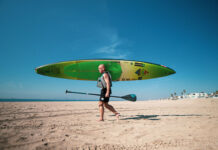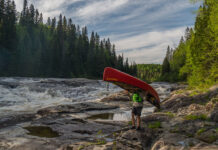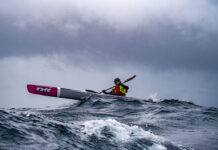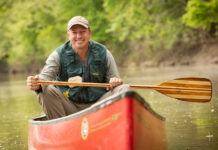In 2009, Alexandra Machicado-McGee was the first and only woman who accepted the invitiation to the Canadian national team trials in whitewater C1 slalom racing. There she then completed the required number of gates to qualify for the national team.
The national team trials would not only change McGee’s life but the course of history for female C1 paddlers. At 17 years old, McGee came in third last in that national event. However from the moment she crossed the finish line, she was hooked and would go on to become an accomplished slalom competitor on the world stage.
McGee grew up near the whitewater mecca of the Ottawa River in Ontario, Canada. She began paddling at eight years old. It wasn’t long before she was soloing a hand-me-down Esquif Detonator. As her skills increased, she cut her on teeth at paddling festivals and open canoe slalom events on the Madawaska and Gull rivers.
McGee has represented Canada all over the world for the last six years. Her most memorable moment came at the 2011 International Canoe Federation (ICF) Worlds in Bratislava, where she placed sixth.
McGee took the last year off from the international competition circuit to complete an undergraduate degree in preparation for law school. She says she was ready to hang up her paddle professionally.
“There needs to be a life after you finish living the dream,”she says, adding that she was ready to focus her energies elsewhere.
However, her dream of competing in the Olympics came roaring back to life this past summer. As the 2016 Rio Olympics wrapped up, much of the buzz for the 2020 games in Tokyo centered on the new sports that will be included, such as climbing and surfing. Lost in the mainstream media hype was the news that for the first time ever, female C1 paddlers may get the chance to compete for Olympic gold.
The ICF has approved a new racing program that would bring equality to the men’s and women’s sprint and slalom disciplines, though this has yet to be ratified by the International Olympic Committee (IOC). To go from C1 pioneer to Olympian is a chance McGee dreams about.
“The future is promising with word that national funding could be coming from the federal government for female competitors for the first time,” says McGee. “Without women’s C1 being included in the Olympics, corporations have not been on board to provide funding or sponsorship because there is no media exposure.”
If women’s C1 slalom is included in the Tokyo Olympics, McGee will then be 28 years old—practically an old-timer by Olympic standards—and a 10-year veteran of the sport. Since first competing in 2009, the number of countries that boast female race training development has grown to 40. If women’s C1 slalom is accepted in the 2020 Olympics, McGee expects that number will only grow.
For a girl who chose the canoe because she could see the waterlines clearer, to a woman possibly representing her country in a first-ever Olympic event, the future is bright.
Gabriel Rivett-Carnac is an assistant editor at Rapid Media. Originally from Victoria, BC, Rivett-Carnac now calls the Madawaska Valley home.
 Watch The Canoe, an award-winning film that tells the story of Canada’s connection to water and how paddling in Ontario is enriching the lives of those who paddle there. #PaddleON.
Watch The Canoe, an award-winning film that tells the story of Canada’s connection to water and how paddling in Ontario is enriching the lives of those who paddle there. #PaddleON.
Alexandra Machicado-McGee paddling at the Madawaska Kanu Centre in Barry’s Bay, Ontario. | Feature photo: Gabriel Rivett-Carnac








